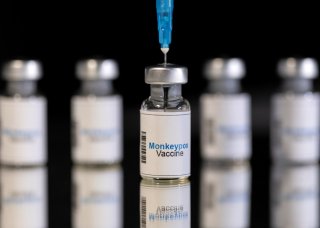Experts Warn the United States Could Be Losing War on Monkeypox
A major problem stems from local health departments that begin tracing contacts only after a confirmed diagnosis, which enables transmissions to continue uninterrupted for weeks or even months.
Primarily due to the United States’ sluggish and timid response to the ongoing monkeypox virus outbreak, there will likely be many more infections before the fast-rising case numbers can be controlled, according to a new report by the New York Times.
Similar to Europe, the monkeypox outbreak is growing rapidly in the United States, with the U.S. Centers for Disease Control and Prevention (CDC) reporting more than 700 cases in thirty-four states, the District of Columbia, and Puerto Rico. Globally, the monkeypox toll has eclipsed 8,100 cases, according to the World Health Organization (WHO). But some experts contend that the actual number is likely much higher due to a lack of awareness and testing.
“Why is it so hard for something that’s even a known pathogen?” Anne Rimoin, a public health researcher at the University of California, Los Angeles, who first warned of monkeypox outbreaks more than a decade ago, told the Times. “How many more times do we have to go through this?”
She added that new pathogens would likely emerge more frequently with increasing travel and trade worldwide. “We’ve been hitting the snooze button on emerging diseases for decades,” she continued. “The alarm is going off, and it’s time to wake up.”
In 2010, the newspaper noted that the United States estimated that in the event of a bioterrorist attack, it would need more than 130 million doses of a vaccine for smallpox and monkeypox. Yet two months after the current outbreak started, the strategic national stockpile still only holds 64,000 doses.
This situation “reveals the failure in the U.S. to take public health seriously,” Zain Rizvi, who studies access to medicines at the advocacy group Public Citizen, told the Times. “Do we ever run out of fighter jets?”
Another major problem stems from local health departments that begin tracing contacts only after a confirmed diagnosis, which enables transmissions to continue uninterrupted for weeks or even months.
“We clearly identified this as a major mistake that allowed Covid to get its footprint in the U.S. and spread undetected for a month, without any of us knowing,” Angela Rasmussen, a research scientist at the Vaccine and Infectious Disease Organization at the University of Saskatchewan in Canada, told the news outlet.
“And now we’re just doing the same thing all over again, because that’s the way it’s done,” she added.
This particular monkeypox outbreak is highly unusual since it is occurring in North American and European countries where the virus is not endemic. Monkeypox is generally found in Central and West African rainforests, where animals that carry the virus live.
According to the WHO, monkeypox is part of the same virus family as smallpox but with milder symptoms. It is an illness that begins with flu-like symptoms and the swelling of lymph nodes, eventually progressing to rashes on the face, hands, feet, eyes, mouth, or genitals that turn into raised bumps that become blisters. The virus can be transmissible for up to four weeks and spreads most easily via open contact with the sores of an infected individual. It can also spread through contact with materials that have the virus on them.
Ethen Kim Lieser is a Washington state-based Finance and Tech Editor who has held posts at Google, The Korea Herald, Lincoln Journal Star, AsianWeek, and Arirang TV. Follow or contact him on LinkedIn.
Image: Reuters.

